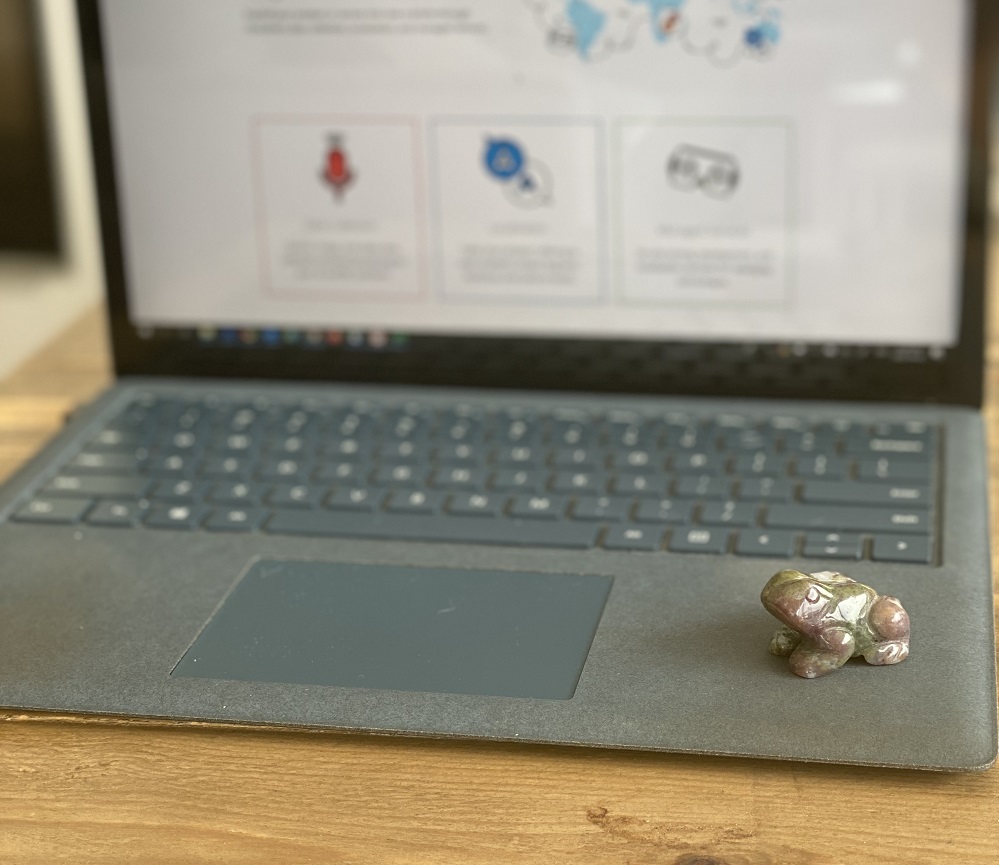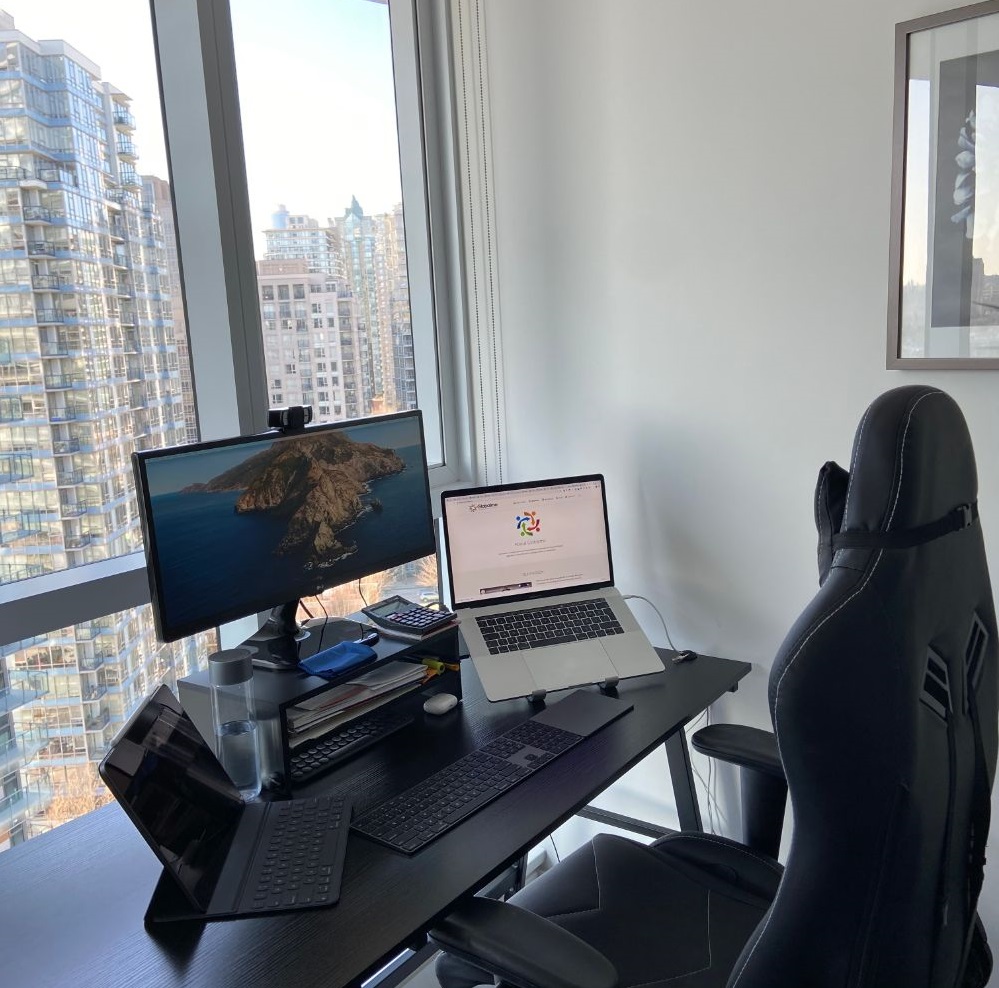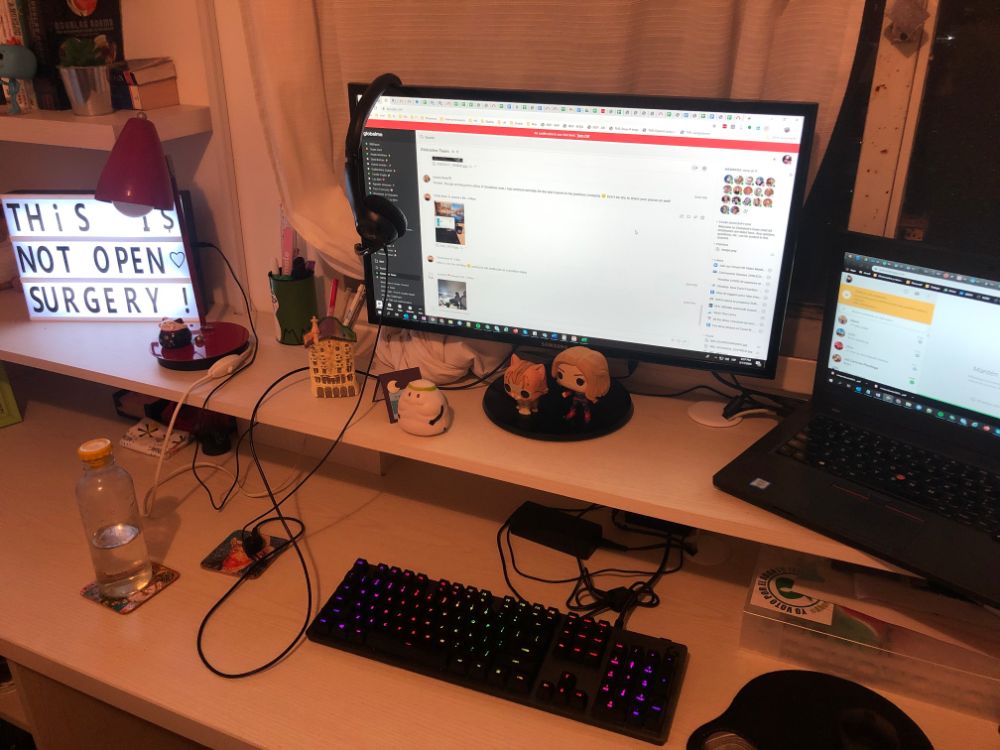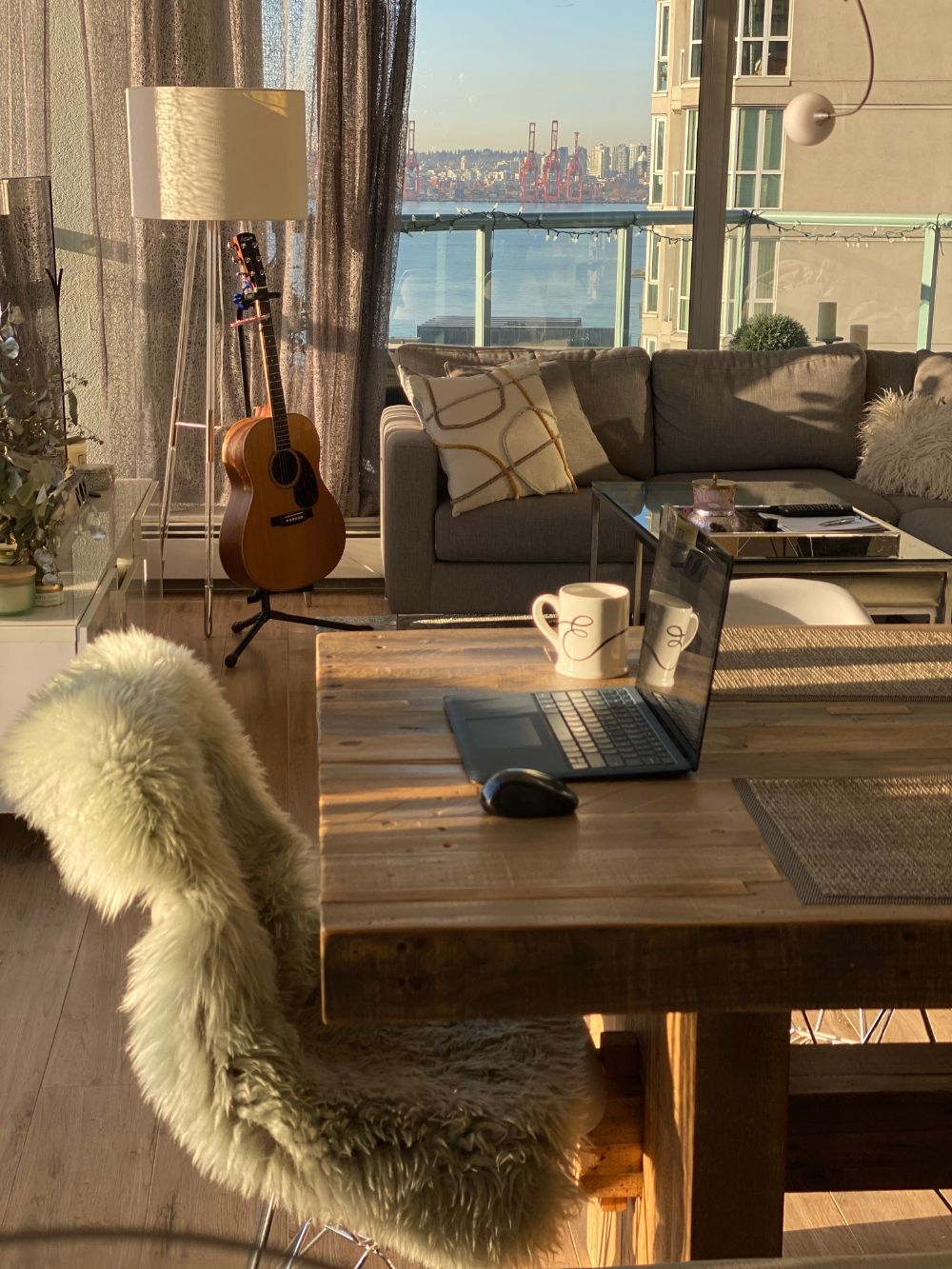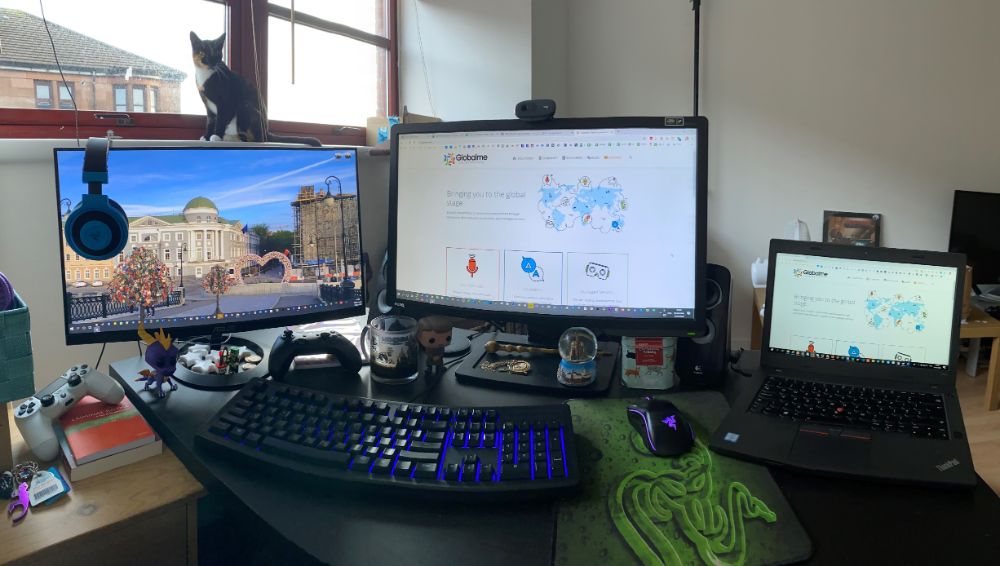
The majority of the world (our team included!) suddenly finds themselves working from home. Here’s some tips to get the most of out it.
Working from home can feel like somewhat of a luxury at first, but it comes with its own unique challenges—even under normal circumstances.
Some things are easier—a shorter commute, easier access to the fridge—while other things become more challenging, like getting enough face time with your co-workers or collaborating on projects.
Because so much of our team already has experience working remotely, we thought we’d share some tips and tricks to help you stay productive, healthy, and feeling great!
How to Structure Your Day
In an office, your day is structured for you. At home, you have to create your own structure.
1. Have a morning routine.
Don’t just roll out of bed and head straight for your desk. Leave yourself some time to get in the right head space.
“For starting the day, follow a routine that signals the beginning of work. Check the weather, make coffee, do 20 push-ups, and START.” – Anas
“I drink one glass of water, one cup of coffee, and do one hour of exercise before doing any work.” – Beat
2. Get ready like you’re going into the office.
Nobody says you can’t be comfortable, but by dressing in your usual office attire, you’re more likely to feel ready for work. You’ll also be prepared for any impromptu meetings where you need to look more professional.
“I follow a strict office start time at 8:45 am and dress up like any other normal day.” – Fabien
“One of the harder things about working from home is keeping structure. Make sure you get showered and dressed just like you were going to an office. Commit to being at work. The good news: the commute is shorter.” – John
3. Start and finish each day by planning your top priorities.
“I write down my to-do list at the end of the day, so when I start my morning, I already know where my focus should be.” – Carol
“Spend 15 minutes the night before planning your major tasks for the next day. In the morning, spend 15 minutes to review those tasks and revise as needed to accommodate the work that arrived overnight.” – Claudette
4. Schedule your day or week as much as possible.
“The biggest potential time waster is jumping between tasks. I block time for certain tasks in my calendar and hold myself to that schedule.” – Eric
“I try to schedule everything in my Google Calendar: breaks, lunch time, dinner. Even things after work like yoga classes or grocery shopping. This way, I feel I always know what to do next and don’t lose time overthinking.” – Fernanda
5. Eat the frog.
Mark Twain once said, “If it’s your job to eat a frog, it’s best to do it first thing in the morning. And if it’s your job to eat two frogs, it’s best to eat the biggest one first.”
“Always tackle the heavy or not-so-pleasant tasks first!” – Emilia
How To Stay Concentrated & Productive While Working From Home
You’ll need proactive ways to stay concentrated without the social pressure of a co-worker looking over your shoulder.
6. Have a dedicated work space.
Our brains automatically shift into certain modes when entering different physical spaces. Just as you should reserve your bedroom for sleeping, you should also reserve a separate space for work.
“Have a dedicated place to work all the time. Ideally, this would be a dedicated room with the door closed. But it could even be a particular corner of any room, or a specific part of your dining table. But it should be designed for working only. Working from your living room couch one day, and at the dining table the next day won’t work in the long run.” – Serkan
7. Have a proper work setup.
Make sure the work space you have setup is conducive to doing great work.
“Simulate an office-like environment. Put non-work-related things on the table away. Open the window every now and work in a bright room, if possible. And working with two screens is fundamental. My efficiency has improved a lot since I went to the office and borrowed a big monitor. ” – Cecilia
“If you have an unstable internet connection, try using a mobile hotspot (if you have a big enough data plan).” – Yingxing
8. Listen to music (in whatever way works for you).
“I listen to music using headphones (just like in the office). I’ve found that headphones help tune out my environment more effectively than using speakers or my laptop.” – Kenzie
“I find music over headphones too distracting. Or music that I know all the lyrics to. I listen to instrumental music from a speaker across the room so that it acts more like background noise.” – Eric
9. Limit distracting notifications.
Cal Newport, a computer scientist at Georgetown University, advocates for “deep work.” He says the mere expectation that we may receive a notification robs us of the ability to focus deeply. Dedicating time not to check any notifications can greatly increase our productivity and creativity.
“I ignore Glip (our company chat) while working on a specific task and then check it once I’m done.” – Fernanda
“I leave my phone in another room during the day and mute all notifications except for my family.” – Eric
10. Avoid task switching.
“Focus on one task at a time if possible. Don’t try to multitask too much. Let those you work closely with know if you will be focusing on a task and less available, and if needed, how they can best reach you in urgent cases. That allows for better focus.” – Hugo
11. Track your time.
Even if your role doesn’t require it, you can keep yourself accountable by tracking your time.
“I get a bit stressed if I spend a bit more time on a task than I estimated/hoped for. Tracking my time helps me keep focus, because I don’t allow myself to get distracted.” – Jen
Work from Home: How to Stay Healthy & Plan Your Breaks
Just because you want to stay productive while working from home doesn’t mean you should be tied to your desk.
12. Schedule your breaks in advance.
“I schedule breaks in my calendar and always leave the desk when I take them—no browsing or watching funny videos!” – Fernanda
“Take breaks regularly. Be careful not to get trapped in the cycle of ‘just one more thing to complete’ when you’re already feeling tired.” – Christian
13. Be open to taking flexible breaks when you need them.
“Go with the flow. As long as it doesn’t interfere with critical production, any time is a good time for breaks. Listen to your body.” – Anny
“I allow a little flow. I’m happy to do some of my more focused work late at night.” – Beat
14. Leave your workstation.
“For my lunch break, I move away from my workstation to make it feel like more of an actual break.” – Hugo
“Take care of your eyes. Look away from your screen every 20 minutes or so.” – Yingxing
“Every couple hours, I walk upstairs and have a quick wrestling match with my son.” – Claudette
15. Go outside.
“I use reminders to get up and walk for 15 mins. I usually bring along my headphones and listen to a podcast or get caught up in the news. 30-45 minutes per day of exercise keeps your mind and spirit refreshed.” – John
“I schedule a bike ride for a nice day where I have a long break between meetings.” – Beat
16. Drink lots of water.
“I always have water beside me, so I have a reason to get up and walk from time to time.” – Ton
“Drink as much water as you do coffee/tea, if not more!” – Hugo
How to Stay Engaged With The Team
Working from home doesn’t mean working in isolation!
17. Over communicate.
“You won’t have as much visibility with your team, so make your presence known. If you need something, ask for it. If you need more time to fully reply to someone’s email, tell them when you’ll get back to them. And don’t feel bad about having to send multiple follow-up messages if someone isn’t getting back to you.” – Eric
18. Be positive and empathetic.
“Without the chance to read body language, it’s harder to interpret someone’s tone. I try to be overly positive in my written communication. Use exclamation points! Use emojis :).” – Eric
You should also be positive when you’re on the receiving end of messages.
“On the flip side, my default assumption is that everyone else’s tone is positive too. Or if someone isn’t getting back to me, it’s not because I did anything wrong—they’re just busy. You’ll go crazy if you try to predict other people’s mental or emotional states, so just assume the best, ask lots of questions, and be diligent in your follow up!” – Eric
19. Use the company chat.
“Sometimes a little, ‘How are you doing today,’ is all it takes to brighten someone’s day.” – Hugo
“We also have a team chat on WhatsApp which is used to talk about non-work related stuff outside of work hours. Our team is quite close, which is great.” – Jen
“I send pictures of otters.” – Andrzej
20. Use video calls as much as possible.
“If you are going back and forth between team members over chat or email, hop on a call instead.” – Anny
“Turn your camera on for every meeting. It keeps everyone more engaged, and it’s an opportunity for a face-to-face connection. And don’t multitask by subtly working on something else. If you’re able to zone out from the meeting, you probably don’t need to be there in the first place.” – Eric
21. Make time for small talk.
“Start internal meetings with a 5-minute chat. Ask how everyone is doing or what you did on the weekend. You’re essentially moving the occasional water cooler talk to a virtual space.” – Christian
“Set a goal: at least one non-work-related chat a day. Ask how your team is doing, how is self-isolation treating them, have they eaten yet, do they need some puppy pics? Otherwise, we are always too busy to know how the people behind our screen are doing.” – Emilia
22. Take part in remote social initiatives.
“While they traditionally planned HQ-based activities like barbecues, the Social Committee has started to plan more activities designed to engage our remote team. We’ve done a steps challenge and a water-drinking challenge, but we’ve also done simpler, more organic activities like posting pictures of our remote workspaces.” – Eric
Helpful Tools and Apps
23. Use a browser blocker.
“My savior is a Chrome extension called Nudge. It prevents me from habitually accessing social media or streaming apps.” – Anas
“I use a website blocker called FocalFilter, which blocks access to sites you think are distracting.” – Gonzalo
24. Use a break-planning app.
“Break Time for Chrome is helpful to remind yourself of taking breaks. I aim for taking my eyes off the screen every 30 minutes or so and to stand up and stretch in my mini-breaks.” – Christian
“I use a Pomodoro Timer, which breaks your day into 20-minute work sprints split up by 5-minute breaks. I’m able to focus more intently when I know a short break is coming soon.” – Eric
25. Practice breathing and meditation.
“Breathing for 10 seconds at a time can help a lot to fend off anxiety and contribute to your state of flow. The Mindful Break app from Google helps a lot by reminding you to take a deep breath at random intervals, or every few minutes.” – John
“Stop, Think & Breathe is a good and free app to do 7-minute bouts of meditation, which are recommended to you based on your mental state.” – John
26. Set posture reminders.
“I also recommend using Posture Minder, a Chrome extension that reminds you to check your posture and walk in customizable time intervals.” – John
How to Separate Work & Home Life
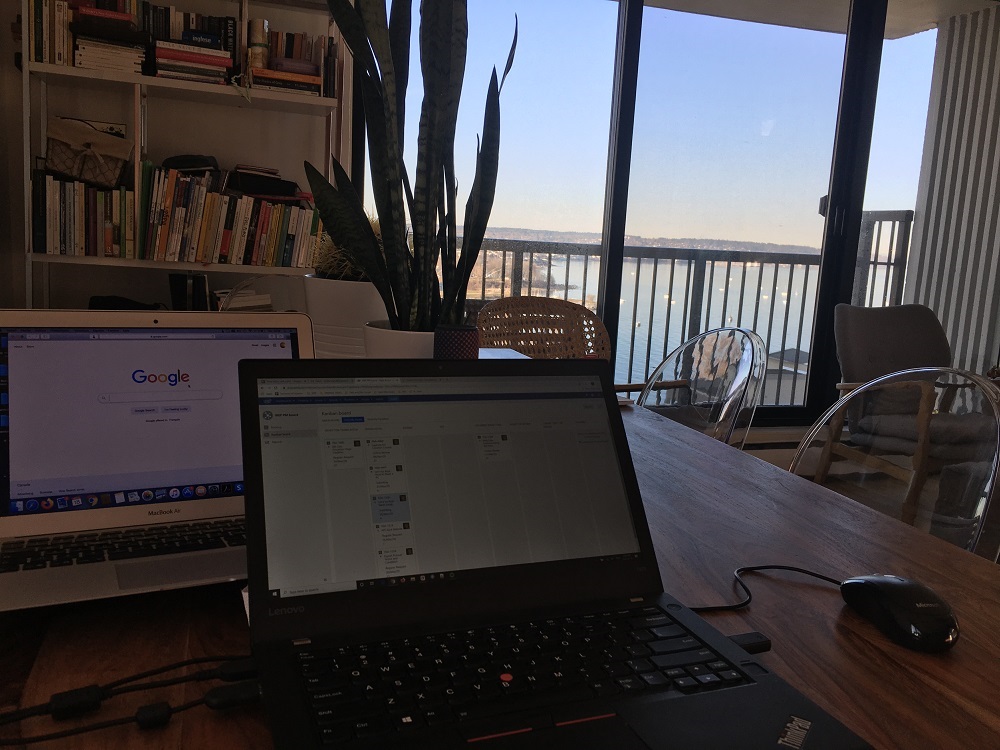
Once you start working remotely, you’ll find the lines start to blur between home and work life. Here’s how to keep the two as separate as possible!
27. Communicate proactively with your family/roommates.
“Sometimes you need to make it clear to your family that you can’t run errands when you are working, and that your time dedicated to work is sacred.” – Gonzalo
“My guidelines with the family is if the door is closed, I’m busy and to knock only in emergencies. I have a whiteboard outside so they can leave notes for things they need help with. I make sure to come out and check on things between calls and work time.” – John
28. Make outside-of-work commitments.
“I never used to be able to separate home and work life until I started a hobby that I do nearly every night. This forces me to finish work on time and get going.” – Jen
“Getting out of the house more or having a structured social life helps make up for the lack of face time you typically would have gotten at the office. We obviously can’t leave the house right now, but that doesn’t mean you can’t schedule workouts or video calls with your friends.” – Eric
29. Turn off notifications outside of work hours.
“I don’t have any work-related notifications on my phone whatsoever. And I don’t turn on my laptop until I am actually going to start working.” – Fernanda
30. Avoid working outside of your scheduled hours.
“I never start working before my scheduled work hours, unless it’s something crucial that I can foresee from the previous day, in which case I rearrange my work hours for that day in Google Calendar.” – Fernanda
31. Leave chores until later.
“Limit the distractions at home. Let dishes sit in the sink until the end of the day, don’t try and get laundry done, because one thing leads to another and pretty soon you’re vacuuming or working in the garage.” – John
32. Or learn what works best for you.
With all of that said, working from home does offer flexibility. If mixing up your day helps you stay productive, then do it! Just be honest with yourself.
“I sometimes start much earlier than usual to be able to take more/longer breaks during the day. I try to take multiple breaks for shopping, cooking, cleaning, laundry, etc. instead of sitting for 8 hours straight, staring at the monitor. I’d rather take a half-hour or 2-hour break than 5 minutes.” – Andrzej
“I use my 5-minute breaks to do quick chores like emptying the dishwasher. Or I play a quick game of fetch with my dogs in the yard. It gets me away from my desk, clears my mind for a few minutes, and frees up time after work.” – Eric
“I split my shift in two parts, with a few hours of free time during the day to do my own things (studying, tidying up, taking my dog out). I also do physical training after work 5 times a week.” – Jen
“Working from home helps in general. You’re closer with the family, you’re easily accessible. If extra time is needed to have a meal with the family, take it. If you need to run an errand between meetings, do it. But be responsible. Ensure extended breaks do not jeopardize the goals for the day and make up the time later on.” – Claudette
It will take some time to develop routines, so don’t be too hard on yourself if it takes some time to adapt to the new reality of working from home.
Ultimately, it’s figuring out what works for you to keep your work-from-home life healthy and productive!
Globalme was acquired by Summa Linguae Technologies in 2019. We kept this blog to preserve the rich history of Globalme that made us who we are today. Enjoy!
